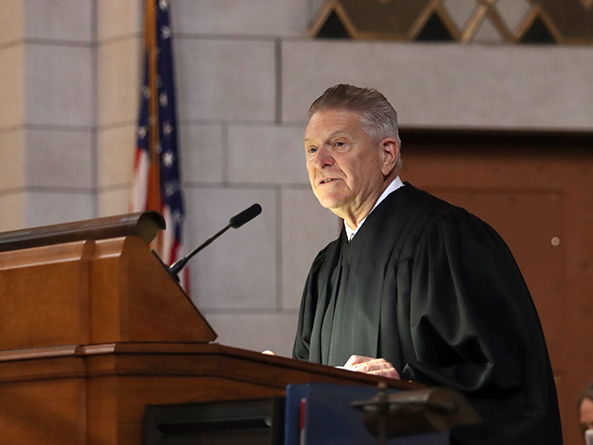Chief justice highlights judicial branch progress, challenges
Nebraska Supreme Court Chief Justice Michael Heavican delivered his State of the Judiciary address to senators Jan. 25.
Heavican began by outlining “significant” improvements in judicial branch staffing. He said the judicial branch workforce now exceeds pre-pandemic staffing levels, with a turnover rate of just over 5%. Those improvements are “no accident,” Heavican said, noting the Legislature’s recent partnership to help address workforce shortages by funding salary increases for judicial branch staff.
Collaborative courts such as problem-solving courts continue to be successful, Heavican said, calling attention to the recent expansion of the Young Adult Problem Solving Court in Douglas County. He said the addition of an employment coordinator to that program has resulted in a 13% decrease in unemployment for participants.
Problem-solving courts also are cost-effective, he said, with an annual average cost of $4,400 for each participant compared to the $41,000 cost for incarceration.
“Like probation, each problem-solving court is the taxpayers’ friend,” Heavican said.
Highlighting the state’s probation programs, Heavican said Nebraska Probation and the Nebraska Department of Labor recently partnered to provide employment training and opportunities for individuals on probation in Nebraska’s 17 community reporting centers.
“This important cooperation will assist [those on] probation with obtaining and maintaining employment to be successful citizens,” he said.
In 2023, there was a 25% increase in youth ordered to probation, but recidivism rates for juveniles on probation have held steady at 19% for the past two years, Heavican said. Despite that success, he said, challenges remain. For example, there is a need to address the state’s lack of juvenile detention facilities, which are located entirely in the eastern side of the state, he said.
“There are no juvenile detention facilities west of this building, and counties have no incentive to fund them,” Heavican said. “We are forced to pay Iowa, Kansas and Wyoming in order to handle our juvenile detention needs.”
Additional funding for language access initiatives also is needed, Heavican said. In 2023, Nebraska courts utilized interpreters for 69 languages, he said. As an example of the workload, Heavican noted that the court served 12 families who spoke six different languages during a single truancy hearing last year in Lancaster County.
The chief justice also noted the need for self-contained IT infrastructure for the judicial branch to assist individuals who are hard of hearing and to address potential security threats.
Recently, the Kansas court system was hit by a cyberattack that compromised sensitive personal information, including Social Security and bank account numbers, Heavican said. Additionally, the attack affected lawyers’ public access to online filings and court documents, highlighting the need for upgrades in court system security, he said.
“Kansas serves as a warning for the rest of us,” Heavican said. “If the Kansas Supreme Court fell victim to a sophisticated foreign cyberattack, without needed upgrades, we must consider ourselves equally vulnerable.”


